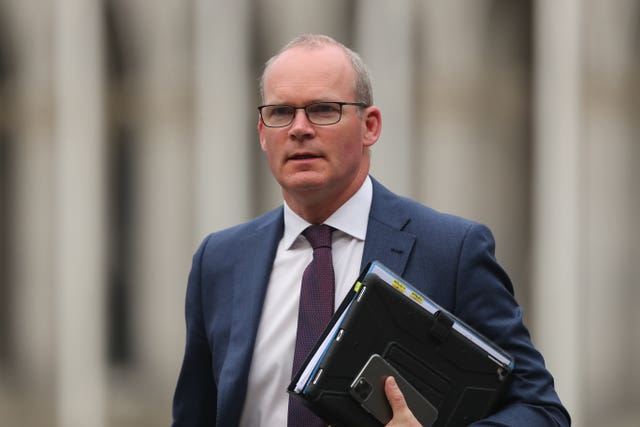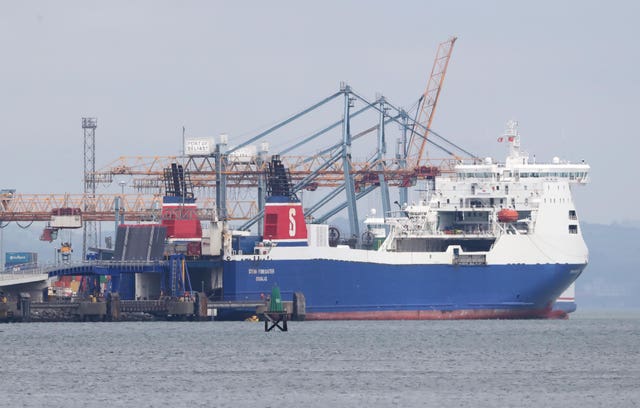
The Irish Government has dismissed reports the EU could block goods entering Northern Ireland from the rest of the UK.
Simon Coveney said there may be “limited checks” on goods coming from Great Britain into the region because there is an agreement to prevent the need for physical infrastructure on the Irish border.
The measures were envisaged to stop goods passing from England, Scotland or Wales into the Republic of Ireland via Northern Ireland tariff-free if no wider agreement is struck between the EU and UK.
READ MORE: Boris Johnson’s Brexit plans under mounting criticism as MPs threaten to rebel against PM
 Simon Coveney said there was no blockade proposed (Niall Carson/PA)
Simon Coveney said there was no blockade proposed (Niall Carson/PA)
Ireland’s foreign affairs minister said: “There is no blockade proposed.
“That is the kind of inflammatory language coming from Number 10 which is spin and not the truth.”
How to keep the Irish border open has bedevilled negotiations on withdrawal from the EU.
in an incendiary article for The Telegraph, Prime Minister Boris Johnson said Brussels was threatening to use an “extreme interpretation” of the Northern Ireland Protocol to impose “a full-scale trade border down the Irish Sea” that could stop the transport of food from Britain to Northern Ireland.
The Government’s new UK Internal Market Bill has immediately run into controversy over its impact on talks with the EU and on international treaties.
It could rewrite parts of the Brexit withdrawal agreement relating to the provisions around all-Ireland trade.
Mr Coveney told the BBC’s The Andrew Marr Show a post-Brexit trade deal was still possible.
He said: “The British Government is behaving in an extraordinary way and British people need to know that, because outside of Britain the reputation of the UK as a trusted negotiating partner is being damaged.”
At present the UK is part of the European single market, with jointly agreed regulations and standards across the continent.
Post-Brexit, the UK Government wants to continue to have a joint market across England, Scotland, Wales and Northern Ireland, known as an internal market.
That means regulations around matters like food standards and animal welfare being set in the UK instead of Brussels.
 Northern Ireland had been due to remain part of the EU for trade purposes unless a wider commerce deal was struck (Niall Carson/PA)
Northern Ireland had been due to remain part of the EU for trade purposes unless a wider commerce deal was struck (Niall Carson/PA)
Northern Ireland had been due to remain part of the bloc for trade purposes unless a wider commerce deal was struck with the EU.
That means Northern Ireland must continue to follow the standards of Brussels to avoid tariffs on all-island trade and keep the free-flowing border in goods with the Republic of Ireland, its EU neighbour, open.
The Irish Government has said the British Government’s plans represents a “serious risk” to the peace process amid acrimony in the negotiations.
READ MORE: Brexit: Justice Secretary Robert Buckland says he will resign if ministers break law in ‘unacceptable’ way
Mr Coveney said: “Both the British and Irish economies are going to be damaged significantly and that will be a significant failure of politics not anything else.”
@simoncoveney – simple question – does Irish Government support UK agricultural products being given 3rd Country Recognition – the Joint Committee & @MichelBarnier should be giving certainty-they aren’t-you can. Every consumer in NI needs to know your position @MichealMartinTD https://t.co/Pf7ty4b1QZ
— Steve Aiken OBE (@SteveAikenUUP) September 13, 2020
He added: “It is possible to get agreement, it will probably be a basic pretty thin agreement.”
The European Commission has given the UK until the end of the month to drop legislation enabling ministers to override the provisions in the Brexit Withdrawal Agreement relating to Northern Ireland.
Following a stormy meeting in London on Thursday, the commission warned the UK was putting trade talks at risk and said it would “not be shy” of taking legal action.
The Prime Minister’s official spokesman, however, reiterated the Government’s position that the provisions in the UK Internal Market Bill remained “critical” to the preservation of the Northern Ireland peace process.
I spoke with @eucopresident @CharlesMichel this morning.
EU27 united in calling for full implementation of the Withdrawal Agreement/Protocol.
International law and agreements must be honoured #Brexit
— Micheál Martin (@MichealMartinTD) September 13, 2020
On Sunday Irish Taoiseach Micheal Martin spoke to European Council President Charles Michel, who leads the EU’s heads of states.
Mr Martin said the EU27 were united in calling for full implementation of the Withdrawal Agreement/Northern Ireland Protocol.
“International law and agreements must be honoured.”


Why are you making commenting on The Herald only available to subscribers?
It should have been a safe space for informed debate, somewhere for readers to discuss issues around the biggest stories of the day, but all too often the below the line comments on most websites have become bogged down by off-topic discussions and abuse.
heraldscotland.com is tackling this problem by allowing only subscribers to comment.
We are doing this to improve the experience for our loyal readers and we believe it will reduce the ability of trolls and troublemakers, who occasionally find their way onto our site, to abuse our journalists and readers. We also hope it will help the comments section fulfil its promise as a part of Scotland's conversation with itself.
We are lucky at The Herald. We are read by an informed, educated readership who can add their knowledge and insights to our stories.
That is invaluable.
We are making the subscriber-only change to support our valued readers, who tell us they don't want the site cluttered up with irrelevant comments, untruths and abuse.
In the past, the journalist’s job was to collect and distribute information to the audience. Technology means that readers can shape a discussion. We look forward to hearing from you on heraldscotland.com
Comments & Moderation
Readers’ comments: You are personally liable for the content of any comments you upload to this website, so please act responsibly. We do not pre-moderate or monitor readers’ comments appearing on our websites, but we do post-moderate in response to complaints we receive or otherwise when a potential problem comes to our attention. You can make a complaint by using the ‘report this post’ link . We may then apply our discretion under the user terms to amend or delete comments.
Post moderation is undertaken full-time 9am-6pm on weekdays, and on a part-time basis outwith those hours.
Read the rules here